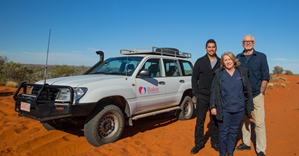 Our work in Aboriginal and Torres Strait Islander health spans major cities to the most remote communities in Australia and includes important collaborations which address global Indigenous health more generally.
Our work in Aboriginal and Torres Strait Islander health spans major cities to the most remote communities in Australia and includes important collaborations which address global Indigenous health more generally.
We are dedicated to carrying out collaborative research projects in response to community needs that build much needed knowledge and that provide practical contributions to Aboriginal and Torres Strait Islander peoples' health.
We are committed to ensuring that Aboriginal and Torres Strait Islander people are engaged and in control of their own health. Our ‘way of doing business' includes working with and empowering Indigenous community-controlled organisations. In addition, we have a focus on facilitating employment and capacity building of Aboriginal and Torres Strait Islander people within our organisation.
We are passionate about using our skills and expertise to learn more about Aboriginal and Torres Strait Islander health and to contribute to better health outcomes. The depth of our commitment is what defines the Baker Institute's work in Aboriginal Health.
Why is this important?
The rate of disease burden among First Nations people is 2.3 times that of non-Indigenous Australians, with chronic diseases responsible for much of this.

